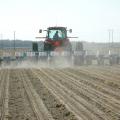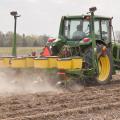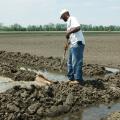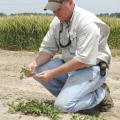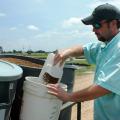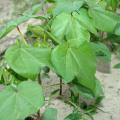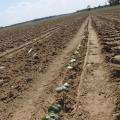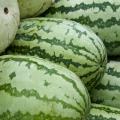Crop Report from 2010
MISSISSIPPI STATE -- Mississippi's winter wheat crop is smaller and later than normal because of fall rains, and a colder-than-normal spring may limit the crop's yield.
Erick Larson, grain crops specialist with the Mississippi State University Extension Service, said Mississippi's wheat acreage is expected to be well short of the 10-year average of 225,000 acres.
By Linda Breazeale
MSU Ag Communications
MISSISSIPPI STATE -- Cotton will not be returning to the throne in Mississippi, but growers are slightly more enthusiastic about this former king than they have been in recent years.
The U.S. Department of Agriculture released its annual prospective plantings report March 31, and Mississippi producers are predicted to plant 340,000 acres of cotton. That is an increase of 11 percent from 2009 but is a far cry from the 1.2 million acres planted in 2005 and 2006.
By Karen Templeton
MSU Ag Communications
MISSISSIPPI STATE -- A cold winter may have delayed strawberry harvesting, but it did not affect the quality or taste of berries.
Mississippi strawberry harvest usually begins in mid-March, but this year, cold weather pushed harvest back to the second week in April.
“Temperatures were about 10 degrees lower than normal, which pushed planting back a week and in turn, delayed harvesting by a few weeks,” said Wayne Porter, Mississippi State University Extension Service agent in Lauderdale County.
By Patti Drapala
MSU Ag Communications
MISSISSIPPI STATE -- Mississippi’s 2010 corn crop is off to a promising start after recent sunny skies and favorable soil conditions gave farmers a chance to plant and manage their fields.
MISSISSIPPI STATE – Having about half of the Mississippi soybean crop planted by late April is allowing producers to breathe a little easier when they look back on the disastrous year they had in 2009.
Trey Koger, soybean specialist with the Mississippi State University Extension Service, urged producers not to make decisions for this year based on the anomalies of last year.
STONEVILLE – Mississippi’s 2010 rice crop is ahead of schedule and looking good, even after strong storms swept through the state in April.
Nathan Buehring, rice specialist at Mississippi State University’s Delta Research and Extension Center, said growers had about 75 percent of the crop planted by the end of April. In the last two years, the majority of the planting took place well into May.
By Patti Drapala
MSU Ag Communications
MISSISSIPPI STATE – Mississippi’s poultry industry is cautiously optimistic that the economic doldrums of the last two years -- brought on by the high costs of energy, feed and debt -- may finally be over.
Insider talk of expansion, new export markets and domestic consumption of eggs and breast meat may be indicators the upswing has begun.
By Karen Templeton
MSU Ag Communications
MISSISSIPPI STATE – Mississippi peanut growers will finish planting on time and will fare better than last year as long as Mother Nature cooperates.
Peanut planting began the first week of May and is slated to wrap up by June 1.
“Planting is going well so far thanks to the moist soil,” said Mike Steede, Mississippi State University Extension Service director in George County. “We need the moisture for the seeds to germinate. The rain we got in the beginning of the month has created some optimal conditions for now.”
STONEVILLE -- The state’s catfish industry -- battling high feed costs, low prices and foreign competition -- is seeing many acres come out of production as producers fight to remain profitable.
In 2009, 15,000 acres of ponds went out of catfish production, and more are expected to leave production this year. Mississippi continues to lead the nation in catfish production and acreage, but the state’s current 65,000 acres is 43 percent short of its peak of 113,000 acres in 2002.
MISSISSIPPI STATE -- Spring rains have been kind to most Mississippi farmers, and conditions are offering cotton one of its best starts in recent years.
Darrin Dodds, cotton specialist with the Mississippi State University Extension Service, said most of the state’s crop has been slightly ahead of schedule.
“The weather has not caused a significant amount of replanting, but there are always exceptions, and if you are one of those farmers, it is significant,” Dodds said. “We also have had some fields needing replanting because of herbicide damage.”
MISSISSIPPI STATE -- After three years of depressed timber markets, prices are increasing because of strong demand for forest products and low inventories of logs following the year’s wettest months.
David Jones, assistant forest products professor with the Mississippi State University Extension Service, said the first half of 2010 showed a marked increase in demand for a number of forest products and price increases in most timber product categories.
MISSISSIPPI STATE – Mississippi’s young cotton crop has already faced a list of challenges including flooding, late planting, insects and now drought.
“It’s been a challenge from the word go,” said Darrin Dodds, cotton specialist with the Mississippi State University Extension Service. “We went from an almost perfect planting season last year to one that seems to have continually fought us this year.”
MISSISSIPPI STATE – Mississippi’s small wheat crop was nearly harvested by the second week of June, and farmers brought in lower-than-average yields.
Erick Larson, grain crops agronomist with the Mississippi State University Extension Service, said individual wheat fields varied greatly in bushels produced.
“The state’s yield should average about 50 bushels an acre, which is a little lower than average, but some producers may harvest yields as high as 80 bushels or more an acre,” Larson said.
By Karen Templeton
MSU Ag Communications
BILOXI – Despite high yields and good-quality berries, a delayed harvest and low prices are impacting blueberry growers.
Blueberry growers started harvesting in late May and early June, about two weeks behind schedule.
By Patti Drapala
MSU Ag Communications
MISSISSIPPI STATE – Many Mississippi dairy farmers are wary about 2010 after the past 18 months proved to be one of the most financially challenging periods ever for the industry.
“2009 is a year most Mississippi dairy farmers would like to forget because of the huge financial hit they suffered as the price they were paid for milk plummeted about 40 percent,” said dairy specialist Lamar Adams of the Mississippi State University Extension Service. “Farmers lost about $1,000 per cow last year.”
MISSISSIPPI STATE -- Good growing conditions are contributing to a bumper crop of tasty watermelons for Mississippians.
David Nagel, a Mississippi State University Extension Service horticulturist, said rains and cool temperatures delayed plantings but warm temperatures later contributed to rapid development. Harvests began in mid-June and peak each year around the Fourth of July.
“We’ve had plenty of warm temperatures and sunshine to produce large and sweet watermelons this year,” Nagel said. “The more sunny days we have, the sweeter the melons.”
By Karen Templeton
MSU Ag Communications
MISSISSIPPI STATE – Favorable early conditions got Mississippi’s corn crop off to a good start, but most parts of the state could use more rain to make this year a successful one.
Corn is in the later stages of maturity, and harvest is slated for early August through September if conditions are right.
MISSISSIPPI STATE – Delayed planting and high summer heat have not kept Mississippi’s soybean crop from looking good as of mid-July, though fields ranged from just planted to nearly ready to harvest.
Trey Koger, soybean specialist with the Mississippi State University Extension Service, said the crop was planted a little later than usual statewide, but many acres in northeast Mississippi were not planted until almost July.
MISSISSIPPI STATE -- Mississippi forage producers are experiencing a major invasion of fall armyworms for the second consecutive year in pastures and hay fields across the state.
Blake Layton, a Mississippi State University Extension Service entomologist, said fall armyworm populations were unusually heavy last year with treatable populations reaching north Mississippi relatively early in the year and eventually extending into Tennessee. In 2010, the southern part of Mississippi needed treatments starting in early June.
MISSISSIPPI STATE -- Today’s economy means people are eating out and purchasing meat products less often, but cattle and hog producers have learned to make the most of tough times.
Livestock producers reduce their cattle herd sizes and hog numbers to reduce the amount of meat on the market and bolster the product prices, which remain at the mercy of the economy.
John Michael Riley, a Mississippi State University Extension Service agricultural economist, said producers work hard to keep their product affordable when money is tight.

